May 16, 2025 | 08:56 GMT +7
May 16, 2025 | 08:56 GMT +7
Hotline: 0913.378.918
May 16, 2025 | 08:56 GMT +7
Hotline: 0913.378.918
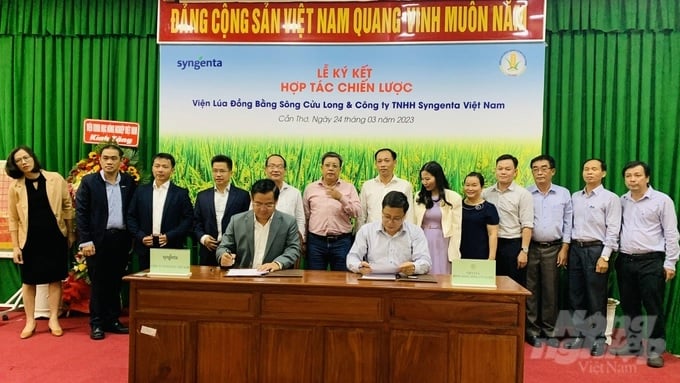
Leaders of Syngenta Vietnam Co., Ltd and Mekong Delta Rice Research Institute signed a strategic cooperation agreement on March 24. Photo: Ho Thao.
On March 24 in Can Tho City, a strategic cooperation signing ceremony took place between the Mekong Delta Rice Research Institute and Syngenta Vietnam Co., Ltd on the research and development of plant varieties. The signing ceremony welcomed the participation of leaders of the Department of Crop Production, Plant Protection Department (MARD), Vietnam Academy of Agricultural Sciences, representatives of the management board of the Mekong Delta Rice Research Institute, and Syngenta Vietnam Co., Ltd.
Over the past years, Vietnam has achieved many achievements in rice production, essential to ensuring national food security and maintaining its position as one of the world's leading rice exporters. However, in the context of increasingly drastic climate change and increasing consumer demands, restructuring the rice industry towards sustainable development is a necessary direction to form and improve the quality of the rice industry, improve farmers' incomes, and create competitive advantages in the international market.
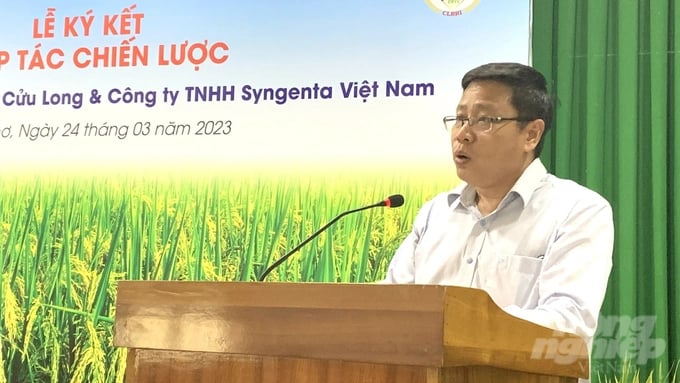
Dr. Tran Ngoc Thach, Director of the Mekong Delta Rice Research Institute. Photo: Ho Thao.
To increase the yield and quality of rice, seed production is a significant factor because good seeds are a prerequisite for a successful crop. Farmers must be guided on applying new scientific and technical advances to production, selecting good varieties suitable to soil conditions and farming practices.
From that fact, Syngenta - a leading global corporation in the field of agro-pharmaceuticals and seeds with more than 30 years of experience in the field of research, development, and trade of seeds in Vietnam - has been opening expanding research and development activities of pure rice varieties as well as plant protection solutions on rice to help farmers make the best choices.
Dr. Tran Ngoc Thach, director of the Mekong Delta Rice Research Institute, said that the Rice Institute was established in 1977 and has made many contributions to rice production in the Mekong Delta. In particular, the field of seeds and rice farming solutions. Syngenta is a multinational corporation with strengths in agro-pharmaceuticals and seeds, operating for over 30 years in Vietnam. Currently, Syngenta is expanding into the field of pure rice and promoting the activities of the seed production industry, not only in Vietnam but also in the Asia-Pacific region.
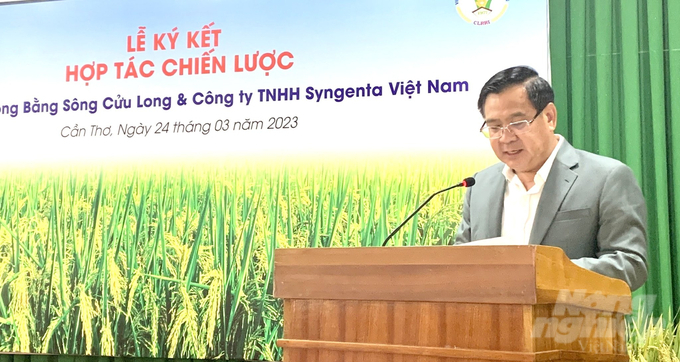
Mr. Tran Thanh Vu - General Director of Syngenta Vietnam Co., Ltd., spoke at the ceremony. Photo: Ho Thao.
Accordingly, in the context that the agricultural sector is currently facing many challenges and negative impacts of climate change, the demands for increased income for rice farmers as well as environmental, health, and food safety issues are growing. Through the signing ceremony today, the Mekong Delta Rice Research Institute and Syngenta will cooperate in testing and evaluating rice varieties, coordinating rice varieties' production, transferring techniques and technologies, and hoping to create many quality rice varieties, contributing to improving the value of Vietnam's rice industry.
Syngenta has cooperated with the Mekong Delta Rice Research Institute to strengthen research and development of plant varieties, exceptionally pure rice varieties, testing and evaluating rice varieties, coordinating rice seed production, and transferring techniques and technologies. Specifically, Syngenta will sponsor and support the Mekong Delta Rice Research Institute for three years (2023-2025) to conduct research and trials to find the best-purebred rice lines and varieties.
In addition, the two sides will also cooperate in plant protection, including research, testing, and evaluation of plant protection products and solutions for pest management on rice, training on agronomy, pests, and diseases, and plant protection solutions on rice for employees, customers, and partners of Syngenta. Through this cooperation, the two sides hope to bring positive results to the rice industry, thereby contributing to sustainable agricultural development in the Mekong Delta and Vietnam.
Speaking at the signing ceremony, Mr. Tran Thanh Vu, General Director of Syngenta Vietnam Co., Ltd., said that Syngenta always focuses on linking with research institutes to promote cooperation in agriculture. Especially rice production - a traditional and essential field of Vietnam, creating livelihoods for millions of farmers nationwide.
The signing of a memorandum of understanding between Syngenta and the Mekong Delta Rice Institute this time will promote the strengths of both sides in the research and development of plant varieties. Especially pure rice varieties and advanced scientific and technological solutions to protect plants, thereby increasing rice yield and quality, ensuring food security, and helping Vietnam maintain its position as the world's leading rice exporter.
Translated by Ha Phuc

(VAN) Vietnam’s TH Group officially put its high-tech fresh milk processing plant into operation in the Russian Federation, marking a historic moment as the first TH true MILK cartons were produced in Russia.

(VAN) Use of high-quality broodstock and biotechnology is regarded as the most effective approach to ensuring sustainable and economically viable shrimp aquaculture ahead of climate change and the emergence of increasingly intricate disease patterns.

(VAN) Carbon farming is a form of agricultural practices that helps absorb more greenhouse gases than it emits, through smart management of soil, crops, and livestock.

(VAN) This is a key content of the Memorandum of Understanding recently signed between the Vietnam Fisheries Society and Kunihiro Inc of Japan.

(VAN) To achieve the goal, local authorities and businesses in Kon Tum province have fully prepared the necessary conditions for the new Ngoc Linh ginseng planting season.
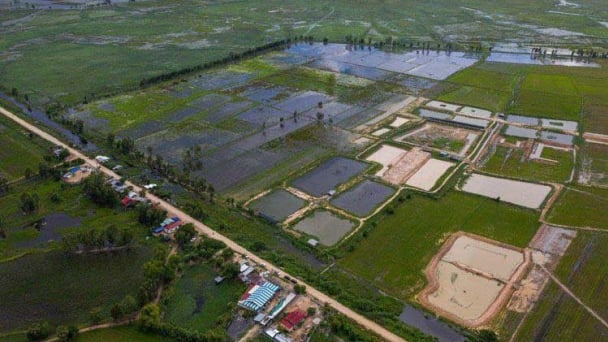
(VAN) Jiangsu province is gearing up to host training programs in Phnom Penh, the capital of Cambodia, this year to establish the Fish and Rice Corridor.
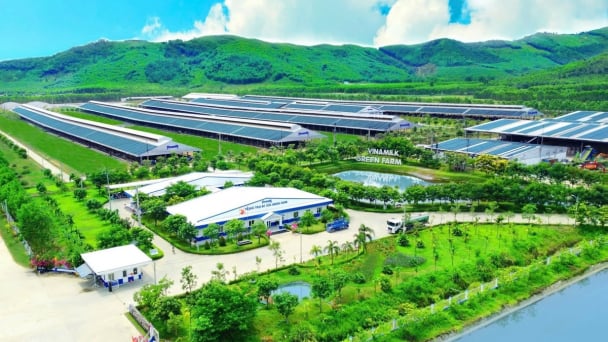
(VAN) Le Hoang Minh, representing Vinamilk, shared the company's experience in energy saving and green energy transition for production at a workshop held during the P4G Summit.